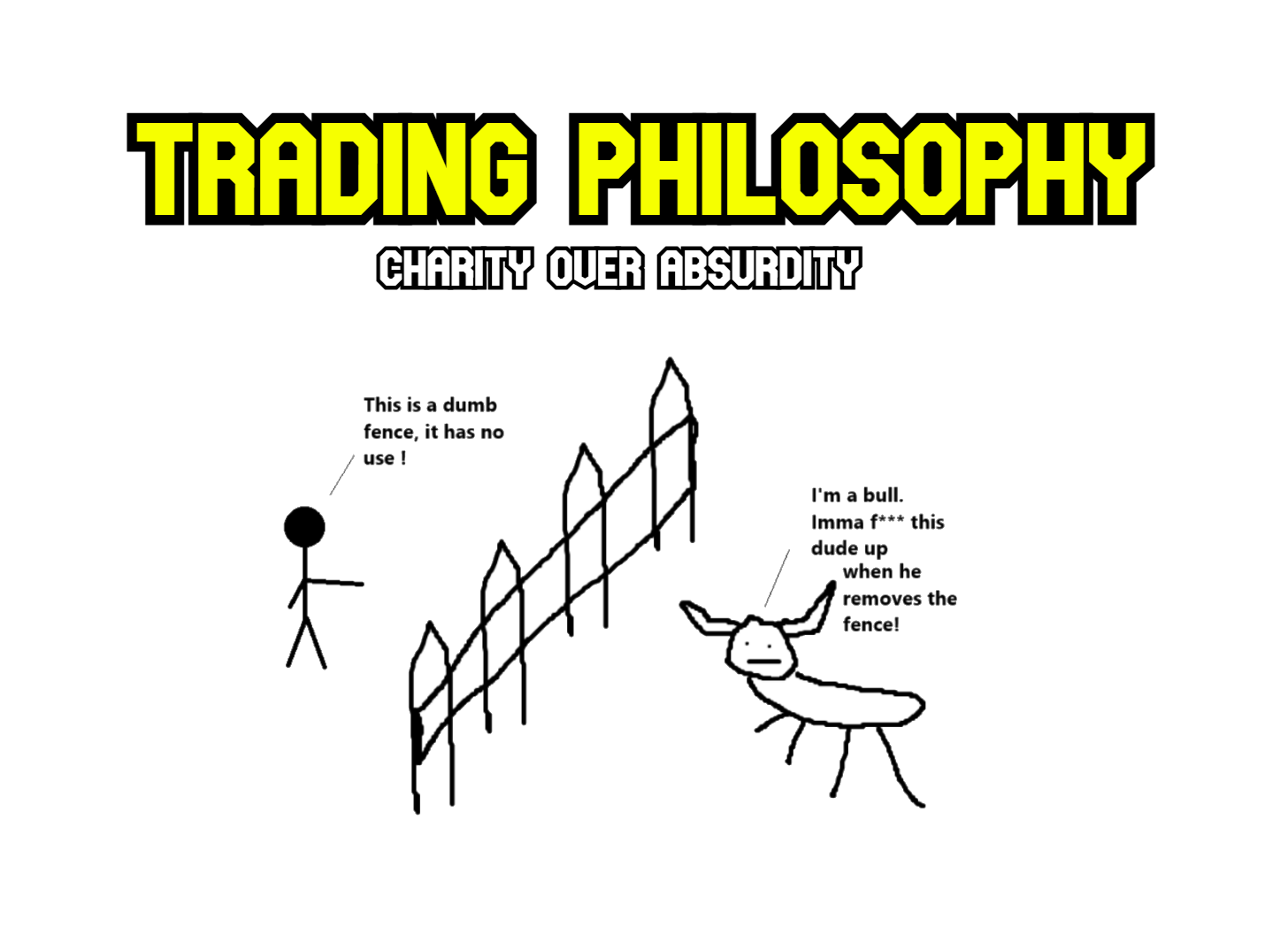Trading Philosophy - Charity over Absurdity
Why Every Trader Should Embrace Chesterton’s Fence—Before the Market Gores Them
Key Takeaways:
Extend intellectual charity—don’t dismiss ideas without testing.
Backtest everything—data beats intuition.
Understand before rejecting—markets often reward those who dig deeper.
Trade with humility—the market will humble those who don’t.
I have been fascinated with the blog Star Slate Codex (SSC) by Scott Alexander for some time now. Whenever I need a thought-provoking read, I often click through and find an interesting post to read. I even referenced SSC on a previous post on the Trading Philosophy series…
During a recent break from posting, I stumbled across some of Scott’s first entries. For his first post ever, he focuses on defining what SSC is about. He describes;
This blog does not have a subject, but it has an ethos. That ethos might be summed up as: charity over absurdity.
This resonated deeply with me, and I believe it’s a principle that every trader—especially beginners—should adopt.
Why Traders Need "Charity Over Absurdity"
Too often, we dismiss ideas based on preconceived biases or surface-level judgments. Instead of immediately labeling an argument as foolish, we should first give it the benefit of the doubt—not just in trading, but in life.
Of course, the trading world is full of noise. Any trading content that you come across should be looked at with a skeptical eye. Of course, a lot of the stuff out there is meant not to teach you but to lure you into buying something. However, this doesn’t mean one should dismiss the content outright. Outright dismissal without investigation? That’s intellectual laziness!
The key is BACKTESTING.
It doesn’t matter how outlandish a trading idea seems—if it can be tested, it’s worth exploring. For example, suppose a trader on X claims:
"Stocks with small floats that gap up 20% or more and rise over 50% intraday tend to repeat this behavior if they have a history of ‘gap-and-go’ price action."
Well, as a studious trader, you wouldn’t take their word for it. Instead, you should:
Collect data on stocks meeting these criteria.
Analyze historical performance to see if the pattern holds.
Test the edge (if any) before risking real capital.
This approach separates serious traders from gamblers. (For those interested, I’ve written a guide on building a trading database and backtesting setups—check it out below.)
Chesterton’s Fence: A Lesson for Traders
Scott Alexander references Chesterton’s Fence, a concept from G.K. Chesterton, to illustrate his point.
A traveler comes across a fence in the middle of nowhere. She thinks “I can’t think of any reason to have a fence out here, it sure was dumb to build one” and so takes it down. She is then gored by an angry bull who was being kept on the other side of the fence.
Chesterton’s point is that “I can’t think of any reason to have a fence out here” is the worst reason to remove a fence. Someone had a reason to put a fence up here, and if you can’t even imagine what it was, it probably means there’s something you’re missing about the situation and that you’re meddling in things you don’t understand. None of this precludes the traveller who knows that this was historically a cattle farming area but is now abandoned – ie the traveller who understands what’s going on – from taking down the fence.
As with fences, so with arguments. If you have no clue how someone could believe something, and so you decide it’s stupid, you are much like Chesterton’s traveler dismissing the fence (and philosophers, like travelers, are at high risk of stumbling across bull.)
The same applies to trading!
When you encounter a strategy, rule, or market behavior that seems illogical, your first reaction shouldn’t be "This is stupid." Instead, ask:
Why might this work for others?
What historical data supports it?
Under what conditions does it fail?
Only after thorough analysis should you decide whether to adopt, adapt, or discard the idea.
Traders, Like Philosophers, Must Beware the Bull
Alexander humorously notes that philosophers—much like travelers—are at high risk of stumbling into a bull (literally and metaphorically). The same applies to traders.
Overconfidence, dismissal of valid but unfamiliar ideas, and failure to understand market structures can lead to catastrophic losses. The market doesn’t care about your opinions—only whether your strategies align with reality.
Final Thought: Trade with Humility and Curiosity
Adopting a mindset of "charity over absurdity" doesn’t mean blindly accepting every claim. It means approaching ideas with curiosity rather than contempt, testing rigorously, and only then forming conclusions.
The best traders aren’t the loudest or most dogmatic—they’re the ones who ask "Why does this work?" before declaring "This can’t work."
So next time you encounter a trading idea that seems ridiculous, remember Chesterton’s fence. There might just be a bull on the other side.
-F4VS
Would love to hear your thoughts—have you ever encountered a "Chesterton’s Fence" moment in trading? Let me know in the comments!
Trading Philosophy - Index:
Trading Philosophy - Eating Glass and Staring into the Abyss
Trading Philosophy - Technical Analysis and Printing Money in the Sky
Trading Philosophy - Why Famous Investors Have Philosophy Degrees...
Trading Philosophy - Charity over Absurdity







